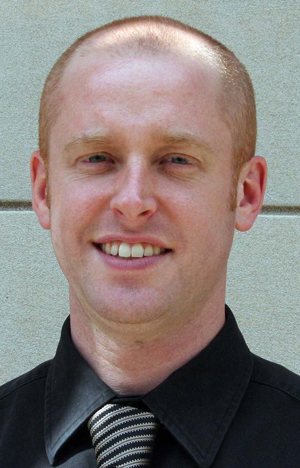Daniel Morris’ dissertation asks one question central to our country’s political well-being.
What virtues are essential for democracy?
The answer, in his academic opinion: humility and mutuality.
“Democracy is the key, and we have to remind people what it looks like,” says Morris, who earned his doctorate in religious studies at the University of Iowa in May. “We are a republic that aspires to democratic ideals. We’re quite a long way from realizing that.”
Morris made his conclusions about key elements necessary for democracy after researching the work of American intellectuals giants John Dewey and Reinhold Niebuhr. Morris contends that Dewey (1859-1952) and Niebuhr (1892-1971) were contemporaries who, despite their well-known philosophical and theological disagreements, actually shared similar concepts of the “democratic self.”,
In his dissertation titled “Dewey, Neibuhr, and Democratic Virtue,” Morris places Dewey and Niebuhr in productive conversation with each other. In the process, Morris shows that both men saw a fundamental incompatibility between the set of character qualities required for a successful democracy and those necessary for capitalism.

“Humility is important because it leads you to listen to your neighbor,” Morris says. “If you don’t have humility, there isn’t much motivation to listen to your neighbors’ needs.”
However, capitalism can impact these positive effects of humility, especially if capitalism has produced a stratified society of differing socio-economic levels.
”Humility can be dangerous because some people are socially conditioned to think of themselves as inferior and that their voice doesn’t belong in the political sphere,” Morris says.
This is where mutuality comes in. Morris says mutuality works as an effective tool for leveling the playing field. Mutuality holds advantages, especially in business, by creating a reciprocal relationship based on common interests. Because of the capitalistic advantages inherent in mutuality, “Mutuality leads people to value equality,” says Morris.
Morris’ dissertation “encourages Americans to think more critically and creatively about what it takes for their country to succeed for the long haul,” according to UI Professor Diana Cates, who served as Morris’s dissertation advisor.
“His dissertation demonstrates that a degree of cooperation can be achieved when political thinkers dare to de-emphasize evident differences in their comprehensive doctrines and focus instead on solving particular problems in their communities,” Cates says.
Support from the Graduate College
A Northfield, Vt., native, Morris received the Ballard and Seashore Dissertation Year Fellowship in 2011-12, which provided him the financial assistance necessary to complete his work.
“(The fellowship) was awesome and amazing. I was able to focus all my energy on producing a high-quality project without having my attention divided,” Morris says.
Morris—a graduate of Davidson College (BA, religious studies) and Yale University (MA, Christian history)—leaves the UI after receiving an “excellent education.”
“In my department, all the faculty members care. It’s almost like they’re working 36-hour days and the rest of us are working 24-hour days,” Morris says. “I can’t say enough about the work they do.”
Morris is the Conrad J. Bergendoff Teaching Fellow in Religion at Augustana College, in Rock Island, Ill.